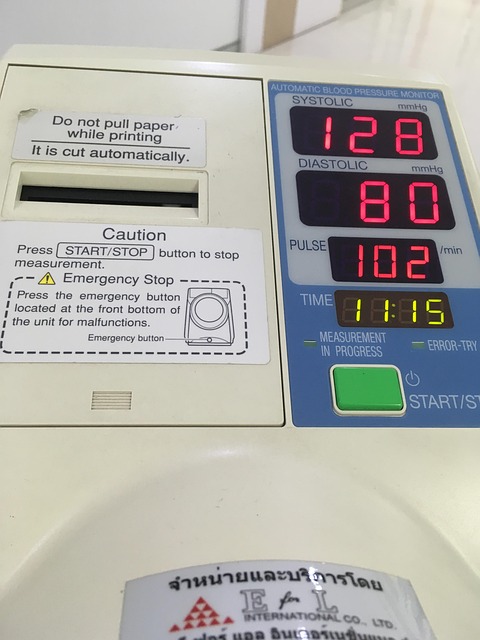Vitamin B12 deficiency, often overlooked in vegetarians, vegans, the elderly, and those with autoimmune disorders, causes symptoms like fatigue, memory loss, balance problems, and anaemia. The UK Standard Thyroid Blood Test, which measures T3, T4, and TSH, is a crucial diagnostic tool for thyroid health and can help identify B12 deficiency through abnormal results. Interpretations should consider homocysteine and MMA levels; discuss with a healthcare provider to determine appropriate treatment, including supplements or injections.
Detecting vitamin B12 deficiency is crucial for maintaining overall health. This article guides you through the process of identifying this common yet often overlooked nutrient gap, focusing on the UK Standard Thyroid Blood Test. Understanding symptoms and risks associated with B12 deficiency is essential, as is knowing how to interpret blood test results accurately. By familiarizing yourself with the UK Standard Thyroid Blood Test, you can take proactive steps towards optimal well-being.
- Understanding Vitamin B12 Deficiency: Symptoms and Risks
- UK Standard Thyroid Blood Test: What You Need to Know
- Interpreting Blood Test Results for Vitamin B12 Levels
Understanding Vitamin B12 Deficiency: Symptoms and Risks
Vitamin B12 deficiency is a condition that often goes unnoticed, yet it can have significant health implications. It occurs when your body doesn’t have enough vitamin B12, a nutrient essential for normal nerve function and DNA synthesis. This deficiency can be caused by various factors, including inadequate dietary intake, malabsorption issues, or certain medical conditions.
In the UK, standard thyroid blood tests often include measurements of vitamin B12 levels as part of their comprehensive assessments. Symptoms of B12 deficiency can vary but may include fatigue, weakness, memory loss, and balance problems. It can also lead to anaemia, causing pale skin, shortness of breath, and dizziness. Individuals at higher risk include those following a vegetarian or vegan diet, elderly people, and individuals with certain autoimmune disorders. Early detection through blood tests is crucial as prompt treatment with B12 supplements or injections can prevent long-term damage to the nervous system.
UK Standard Thyroid Blood Test: What You Need to Know
In the UK, the standard thyroid blood test is a crucial tool for diagnosing and monitoring thyroid health. This comprehensive test evaluates the levels of key hormones and proteins related to thyroid function, providing valuable insights into overall metabolic health. Typically, healthcare professionals order this test when suspecting thyroid disorders such as hypothyroidism or hyperthyroidism. The UK Standard Thyroid Blood Test includes measurements of T3 (triiodothyronine), T4 (thyroxine), and TSH (thyroid-stimulating hormone). These hormones play a pivotal role in regulating metabolism, influencing almost every cell in the body.
Understanding the results of this test is essential for effective treatment planning. Normal ranges for T3, T4, and TSH levels vary slightly between laboratories, but generally, T3 and T4 levels should be within specific ranges, while TSH should fall into a particular reference interval. Deviations from these norms may indicate underlying thyroid conditions that require medical attention. Early detection through this standard test is key to managing vitamin B12 deficiency-related thyroid issues effectively.
Interpreting Blood Test Results for Vitamin B12 Levels
Interpreting your blood test results for Vitamin B12 levels is crucial in understanding your overall health, especially in the UK where standard thyroid blood tests often include a check for this essential nutrient. The results are typically presented as pg/ml (picograms per millilitre) or nmol/L (nanomoles per litre). A normal range can vary slightly between laboratories but generally falls between 140-900 pg/ml or 150-700 pmol/L. If your levels fall below this, it may indicate a deficiency.
Doctors consider several factors when interpreting these results. Mild deficiencies might show up as elevated homocysteine levels and low methylmalonic acid (MMA) levels. More severe deficiencies can lead to significantly higher homocysteine levels and MMA levels that exceed the reference range. It’s important to discuss your results with a healthcare professional who can provide personalised advice based on your medical history and symptoms, as some conditions or medications can affect Vitamin B12 levels.
In light of the above, early detection of Vitamin B12 deficiency through the UK Standard Thyroid Blood Test is crucial. By understanding symptoms, being aware of risk factors, and interpreting blood test results accurately, individuals can take proactive steps to maintain optimal health. Regular checks and open communication with healthcare professionals are essential in navigating this critical aspect of wellness.
